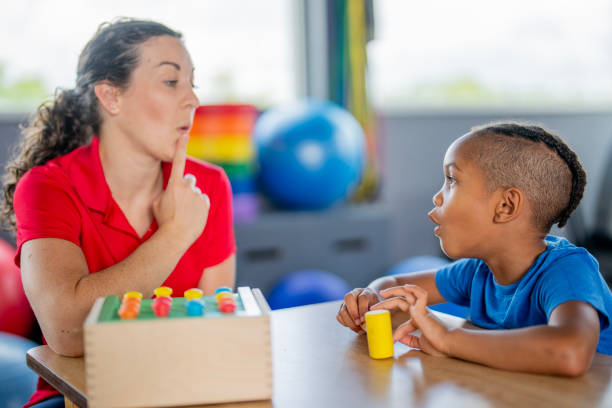School Based ABA Therapy: Enhancing Learning for Children with Autism

School Based ABA Therapy is a specialized approach designed to support children with autism and other developmental challenges within the school environment. This therapy utilizes the principles of Applied Behavior Analysis (ABA) to help students improve their social skills, communication, and academic performance. In this article, we will explore the benefits of school based ABA therapy, how it works, and what parents can expect from the process.
What is School Based ABA Therapy?
School Based ABA Therapy involves implementing ABA techniques in a school setting to address the unique needs of students with autism. The goal is to create a supportive learning environment where children can thrive academically and socially. By working closely with teachers, therapists, and families, school-based ABA therapy aims to enhance the overall educational experience for children with developmental challenges.
The Benefits of School Based ABA Therapy
There are numerous advantages to incorporating school-based ABA therapy into a child's educational plan. Here are some key benefits:
1. Individualized Support
One of the primary advantages of school-based ABA therapy is the individualized support it provides. Each child has unique strengths and challenges, and ABA therapy allows for tailored interventions that address specific needs. This personalized approach helps children make meaningful progress in their learning and social interactions.
2. Integration with Academic Curriculum
School Based ABA Therapy is designed to align with the academic curriculum, making it easier for children to apply the skills they learn in therapy to their classroom activities. By integrating therapy into the school day, children can practice new skills in real-time, reinforcing their learning and promoting generalization.
3. Collaboration with Educators
Collaboration between therapists and educators is a crucial component of school-based ABA therapy. By working together, they can create a cohesive support system that benefits the child. Teachers can implement strategies learned in therapy, while therapists can provide guidance on how to address specific behavioral challenges in the classroom.
4. Improved Social Skills
Social skills are essential for success in school and beyond. School Based ABA Therapy focuses on teaching children how to interact appropriately with peers and adults. Through structured activities and role-playing, children can develop essential social skills, such as taking turns, sharing, and initiating conversations.
How Does School Based ABA Therapy Work?
School Based ABA Therapy typically follows a structured process that includes assessment, goal setting, and ongoing evaluation. Here’s a closer look at how it works:
Initial Assessment
The first step in school-based ABA therapy is a comprehensive assessment conducted by a qualified behavior analyst. This assessment involves observing the child in the school environment, gathering information from teachers and parents, and identifying specific areas of need. The goal is to create a clear understanding of the child's strengths and challenges.
Goal Setting
Once the assessment is complete, the behavior analyst will work with the school team to set specific, measurable goals for therapy. These goals may focus on various areas, such as communication, social skills, or academic performance. The goals will be tailored to the child's unique needs and will guide the therapy process.
Implementation of Therapy
After establishing goals, the therapist will begin implementing the ABA therapy program within the school setting. Sessions may occur during the school day, allowing the therapist to work directly with the child in their classroom. During these sessions, the therapist will use various techniques, such as positive reinforcement, modeling, and prompting, to teach new skills and modify behaviors.
Ongoing Evaluation and Adjustment
School Based ABA Therapy is an ongoing process that requires regular evaluation and adjustment. The behavior analyst will monitor the child's progress and make necessary changes to the treatment plan. This flexibility ensures that the therapy remains effective and aligned with the child's evolving needs.
What to Expect from School Based ABA Therapy
Families considering school-based ABA therapy may have questions about what to expect during the process. Here are some common aspects to keep in mind:
Commitment and Consistency
School Based ABA Therapy requires commitment and consistency from both the therapist and the school staff. Regular sessions and practice in the classroom are essential for achieving meaningful progress. Families should be prepared to actively participate in the therapy process and reinforce skills at home.
Collaboration with Professionals
Collaboration is a key component of school-based therapy. Families will work closely with the behavior analyst, teachers, and other professionals involved in their child's care. This teamwork ensures that everyone is on the same page and working towards the same goals.
Progress Monitoring
Families can expect regular updates on their child's progress. The behavior analyst will provide feedback and share strategies for reinforcing skills at home. This ongoing communication helps families stay informed and engaged in their child's development.
Choosing the Right Provider for School Based ABA Therapy
Selecting the right provider for school-based ABA therapy is crucial for your child's success. Here are some tips for finding a qualified professional:
Look for Credentials and Experience
When searching for a provider, ensure that they have the appropriate credentials and experience in ABA therapy. Look for board-certified behavior analysts (BCBAs) who have a strong background in working with children with developmental challenges.
Read Reviews and Testimonials
Researching reviews and testimonials from other families can provide valuable insights into a provider's effectiveness and approach. Look for feedback that highlights the provider's ability to connect with children and support families.
Schedule a Consultation
Before committing to a provider, consider scheduling a consultation. This meeting allows you to ask questions, discuss your child's needs, and gauge the provider's approach to therapy. A good provider will be open to communication and willing to collaborate with your family.
Conclusion
School Based ABA Therapy offers a personalized and effective approach to supporting children with autism and other developmental challenges within the school environment. By providing individualized support, integrating therapy with the academic curriculum, and fostering collaboration among educators and therapists, school-based ABA therapy can lead to meaningful progress in a child's social and academic skills. If you're considering this approach for your child, take the time to research providers and find the right fit for your family's needs. Together, you can create a supportive educational environment that encourages growth and success.
Note: IndiBlogHub features both user-submitted and editorial content. We do not verify third-party contributions. Read our Disclaimer and Privacy Policyfor details.




